Best 50 Albums Of The Decade So Far (#10 – #1)
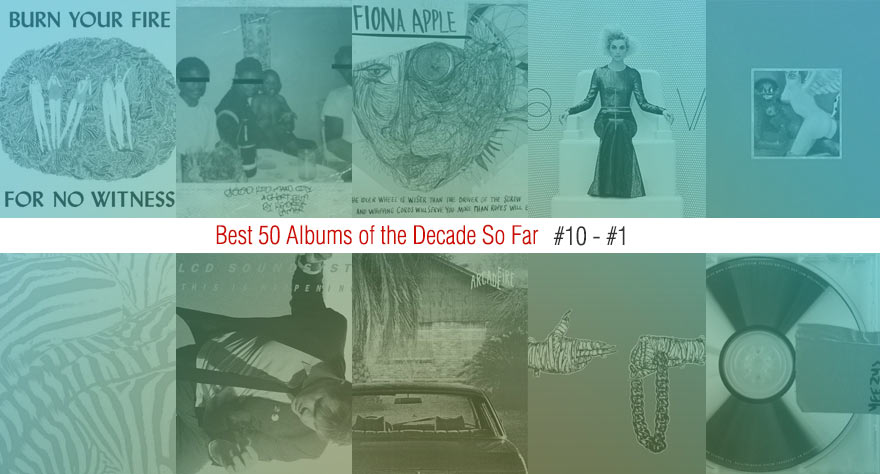
The big ten are here. These ten albums aren’t merely our favorites; they’re veritable modern classics that will go on to shape the course of music as time passes. In fact, some of them have already imparted a huge impact to artists that have achieved success in their wake.
It’s safe to say that the brilliance of these albums over the past five years has influenced the sounds currently being produced, and even albums we’ve already discussed in the previous four lists. These are the kings, queens, and genderless royalty of this decade’s albums to date. And after we list these albums, you can find our contributors’ picks for personal favorites left off the overall list—we call these Passionate Orphans—as well as why we think these albums should’ve made the cut.
Listen to all the albums on this list conveniently on our Spotify playlist, and check out all the other playlists we’ve made to get you caught up on the best this decade has offered us so far.
Best 50 Albums Of The Decade So Far (#10-#1)
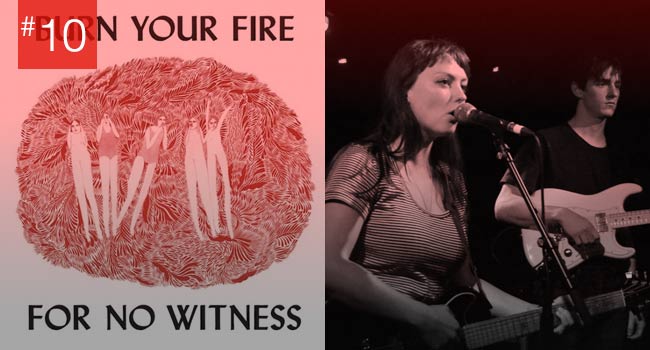
Angel Olsen – Burn Your Fire For No Witness
Angel Olsen’s ghostly, haunting, lo-fi folk albums for Bathetic Records indicated that she had even greater things to come. After signing to bigger label Jagjaguwar and entering the studio with storied producer John Congleton and a full band to expand her sonic palette, she released sophomore album Burn Your Fire For No Witness in 2014 to still-growing acclaim. Many listeners will enjoy these songs on an initial listen of this album, and subsequent listens will likely expand on the emotional appeal of these songs. But their deep, undying resonance is achieved unexpectedly, after some time away from the album; these songs play forever in listeners’ heads, their candor and vitality never fading. On Burn Your Fire For No Witness, Olsen achieves the daunting task of turning her personal romantic struggles into unforgettable, uniting art via eleven fascinating, highly re-playable songs.
On a formal level, Burn is riveting due to its diverse influences. “High and Wild” throws piano shuffle and 12-bar blues into a rockabilly shuffle; “Forgiven/Forgotten” screams with grunge power; “Stars” aches with PJ Harvey’s primal, terrifying beckon; “Lights Out” slowly drips with swirling, dizzying echo and reverb. On a sonic level, each of Olsen’s many masks suits her incredibly well, and each of these eleven songs is branded with her unique mark despite their often divergent styles. Few musicians could get away with including the dreary folk sprawl of “White Fire” on the same album as the fully ironic cowgirl spree of “Hi Five,” but on Olsen’s watch, genres don’t mean a thing. Her priority is choosing any vehicle fit to deliver her breakup anthems, and she’s able to employ a wide diversity of approaches thanks to her nifty lyricism. “High and Wild” uses a handful of witty metaphors to describe a lover who’s departed in spirit, but still physically present; “Stars” describes the plight of an emotionally traumatic relationship without ever explicitly stating it; “Unfucktheworld” tries to find solace in solitude. With words and instrumentals this powerful and clever converging, it’s no wonder Burn has so much staying power and longevity. [Max]
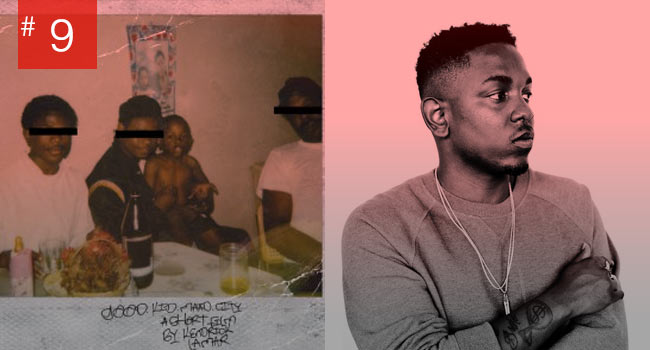
Kendrick Lamar – good Kid, m.A.A.d. City
Following up on the success of his iTunes-independent record debut, Section.80, Kendrick Lamar got signed on one of the biggest rap labels in the country, under the tutelage of Dr. Dre. Thanks to Aftermath, Lamar released a concept-album as his second record (and first on a major label), pouring out his thoughts, dreams, and worries about the current state of rap, but mostly nostalgically and therapeutically reminiscing about his lifestyle growing up in Compton, California. Labeled as a short film on the cover, good kid, m.A.A.d City introduces various characters (“Sherane” on the opening track, Lamar’s parents through hilarious and poignant voicemails, and so on) and is incredibly effective in how it shapes an entire world of a disenfranchisement community, abound in poverty, violence, and all kinds of vice. It’s clearly a cathartic exercise for Lamar, who had to dodge vile temptation at every corner in order to become the artist he is. In that way the entire album is greater than the sum of its parts, and its parts are some of the greatest examples of modern hip-hip, so what does that tell you? Personal standouts include, “The Art of Peer Pressure,” “Money Trees,” “good kid,” and “m.A.A.d City,” but the biggest appeal of the album is between the lines; its complex structure that halves tracks to emphasize the duality of Lamar’s struggle, and the snippets and samples of various characters anchoring the narrative and thematic depth of the story. Supported with Lamar’s exceptional delivery and lyrical skill, and mature production values, good Kid, m.A.A.d City will likely remain one of the decade’s greatest examples of contemporary hip-hop. [Nik]
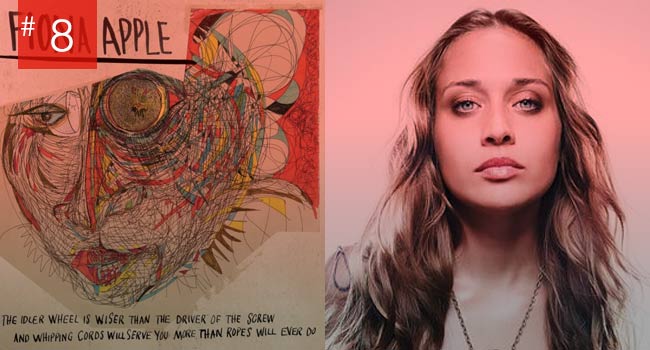
Fiona Apple – The Idler Wheel…
One of the most idiosyncratic, under-appreciated songwriters of our generation, Fiona Apple seems to love to keep us waiting—and waiting—and waiting for her to gift us with new batches of songs, which don’t come out frequently enough. She’s often said that, for her, writing is a necessity, an uncontrollable act that springs up when she’s accrued so much pent-up angst and hate and regret that she has no choice but to sit at the piano and empty out her mind and soul. Her career started nearly twenty years ago, and yet we’ve only been graced with four albums, her latest, The Idler Wheel… releasing in 2012 after a seven-year hiatus. Why does she torture us so?!
The reason her fans so rabidly await her work is that she’s really, really good at what she does. Not just good, but good in a way almost no one else working is. Her vocals are a study in controlled chaos, quivering when she’s sad, lilting when she’s happy, and insanely tense when she’s pissed off. Her lyrics are her main source of strength, streams of consciousness that are poetic and eloquent while also being bizarrely childish and impish as well. (Apple’s stated that she loves combing the dictionary for strange words to use in her songs.)
On The Idler Wheel…, Apple loosens up a bit after her gorgeous, streamlined third LP Extraordinary Machine, creating darker, more tumultuous soundscapes that harken back to the aggression and vinegar that informed her early work. The spectrum of emotion she plays with here is vast, though as per usual, the persistent theme is relationships-gone-south and the resulting ping-pong of feels. There’s some pretty disturbing stuff she deals with here, like in “Werewolf,” in which she talks about coaxing out the monstrous side of a lover who’s otherwise a great guy. On “Anything We Want,” she sings, “My scars were reflecting the mist in your headlights/I look like a neon zebra shakin’ rain off her stripes,” a perfect example of her ability to come up with lyrics that could have sprung from the mind of no one else. Even her piano chops, which were excellent even in the ‘90s, have evolved in a strange way. Take The Idler Wheel…’s fourth track, “Jonathan.” The almost discordant piano riff permeating the song is as stripped-down as it gets, a stupid simple sequence of notes and chords that, while easy to play, is ingenious in its conception. When the melody and lyrics come in and somehow blend perfectly with the left-field chord progression, Apple’s gift is on full display. [Bernard]

St. Vincent – St. Vincent
Annie Clark doesn’t seem to be showing any signs of tempering her artistic ambitions as her career as indie pop monarch St. Vincent continues to blossom. Her first two albums, Marry Me and Actor, were excellent collections of well crafted songs that appealed very directly to those with a taste for approachable art pop. Her third LP, Strange Mercy, took a step into noisier territory, draping abrasive electronic crackling and buzzing over her beautiful melodies and lyrics, which dealt with love in a bittersweet, almost mournful way. A goth-domestic theme bumped the ambitiousness of that album even higher. With her fourth, self-titled album, Clark pushes the envelope further than ever before, maintaining her pop appeal just barely. The crunchy, textured instrumentals she concocts with producer extraordinaire John Congleton sound like shattered digital glass over her beautiful, fuzzed-out vocals and technical guitar playing. Very much like Kendrick Lamar, Clarke is a music industry anomaly in that, as her albums get weirder and funkier and further out of line with convention, her sales get better and better. It’s an encouraging sign that the industry’s still got a beating heart underneath all the scrambling and panic over how to monetize this stuff.
Clarke is a goddamn wizard on the guitar, and she shreds harder and faster on this album than ever before. The driving lead single, “Birth in Reverse,” is an onslaught of catchy, nimble guitar riffs that slice through the air like a switch blade. “Digital Witness,” the subsequent single that has one of the coolest music videos ever, is a cautionary tale about the mesmerizing, indoctrinating effects of smart phones, television, and any other screen that fills our heads so completely we’ve got no room for anything else. “I want all of your mind!” she beckons in a voice that recalls the oddball characters Kate Bush plays on her records. On this track she leaves the axe on the stand, revisiting the punchy horn sounds she explored with David Byrne on their joint album, Love This Giant, to head-nodding effect. There seems to be a fascination with synthesizers and glitchy noises seeping into Clarke’s work more and more as she evolves as a musician and writer, and St. Vincent could very well be the peak of this stage in her artistic journey. It’s hard to imagine her work getting more out-of-this-world than this, but then again, St. Vincent never fails to surprise. [Bernard]
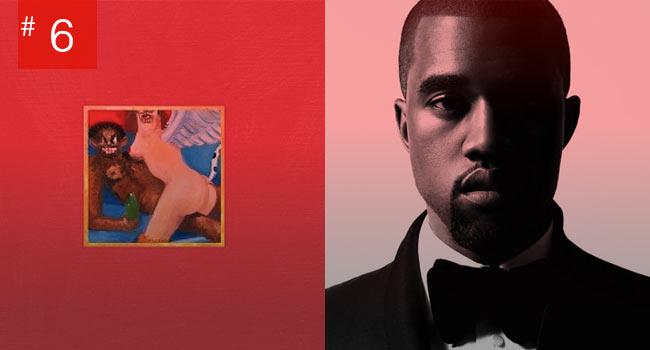
Kanye West – My Beautiful Dark Twisted Fantasy
Following Kanye West’s strange, successful auto-tune opus, 808’s and Heartbreak, he returned to his more aggressive, sample-crazy mode with My Beautiful Dark Twisted Fantasy, an ambitious, cinematic journey through the shadier side of his celebrity that’s arguably one of the top two albums in his discography. Crafting monstrous, symphonic beats with samples from King Crimson, Bon Iver, Aphex Twin and Smokey Robinson, West reached higher levels of drama and epic-ness than we’d seen from him before. His gift for manipulating samples to his whim, turning them into heightened, mutated versions of their former selves is astonishing, and on this album he excels maybe more than ever.
The album’s gurgling, white-hot centerpiece banger is “Monster,” a study in creep-out braggadocio featuring his ol’ buddy Jay-Z, Rick Ross, Justin Vernon, and Nicki Minaj, who blasts us in the face with some of the best bars of her career, surprisingly out-rapping everyone else on the track, including the almighty HOVA. John Legend and Chris Rock lend a hand in “Blame Game,” a meditation on spousal abuse, unrequited love and heartbreak, while the sonic fireworks show “All of the Lights” features a litany of guests, including Rihanna (in the most prominent singing role), Elton John, Kid Cudi, Fergie, John Legend, Alicia Keys, and more.
Back in 2010, embroiled in a firestorm of controversy that took its toll on his head, West conceived the album while on a head-clearing retreat to Hawaii as a reactionary piece to to the media’s coverage of his infamous outburst at the 2009 MTV Video Music Awards. Disgusted by his public crucifixion, he hit the studio and birthed this ungodly, effed-up collection of tracks that reminded everyone why we’ll probably never be rid of him: he makes undeniably dope-ass beats. Every track on the album works in tandem with the others to create a sonic collage that vividly depicts the mind of a man pushed to the edge, both creatively and psychologically. [Bernard]
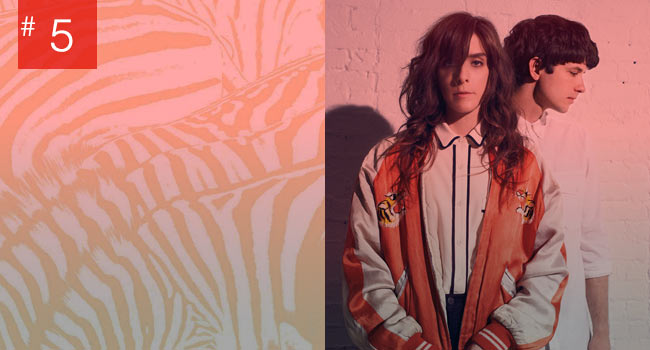
Beach House – Teen Dream
Has an album ever sounded so devastating that you actually want to console its creators for the events that inspired it? Many albums might incite this reaction, but Teen Dream is the decade’s boldest, most penetrating example of such a collection. Melancholy, despair, and hopelessness absolutely flood out of this album; in an era full of heartbreaking, gut-wrenching music, Teen Dream may actually be the saddest album of recent times. It’s anything but melodramatic, though; rather than begging for pity and pining for attention, it paints vocalist Victoria Legrand’s ruin as universally relatable. It’s an incredible aid for powering through any emotionally wrangling situation, as the solemn beauty rushing from these songs tells their listeners that we’ll get through this together.
Teen Dream is the first album Beach House recorded for Sub Pop after two albums on smaller, but still quite reputable, label Carpark Records. The greater financial freedom and resources of their new label allowed Beach House to shatter the lo-fi sheen that had previously gathered them a cult following and rebuild themselves with gorgeous, shimmering production that built them into the indie rock staple they are today. The breathtaking slide guitars and torch-song vocals of “Silver Soul” burst forward thanks to the barriers of Beach House’s newly slick recording style; the crystalline, high-stakes piano of penultimate “Real Love” gain substantial power due to the drastically increased fidelity. The more focused, precise production enables “Zebra” to remain Beach House’s most adored song in 2015, but deeper cut “10 Mile Stereo” remains the duo’s home run. If the impassioned exhausted vocal delivery, cautiously enveloping synths, tearfully galloping guitar line, and song-long upward surge doesn’t do the trick, just read this one lyric: “Limbs parallel/we stood so long we fell.” It’s perhaps the album’s most heartbreaking line, but there are myriad contenders for second place. Teen Dream is rife with potent poetry; it’s downright one of the most emotionally wrecking collections of music ever recorded. [Max]
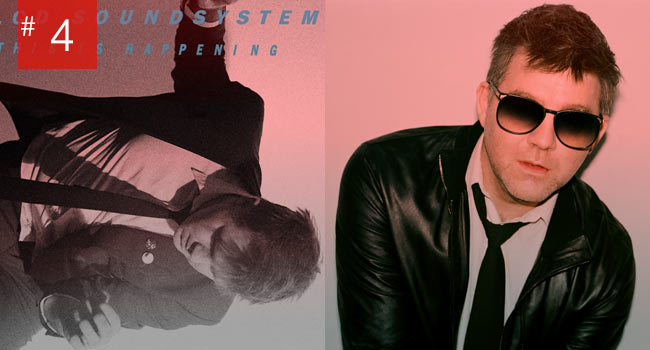
LCD Soundsystem – This Is Happening
In the previous decade, LCD Soundsystem was regarded as the paragon of clever, metropolitan dance-punk, but it wasn’t until 2010 that “dark” and its countless cousin words entered the conversation. This Is Happening, James Murphy and Co.’s final album, puts extra effort into sounding far more brooding than the two albums that preceded it, and it succeeds wildly in this pursuit. The nine songs comprising the album often forgo LCD Soundsystem’s notoriously zany, kraut-like chants (well, except on “Pow Pow” and “Drunk Girls,” the album’s two weakest songs) in favor of moodier anthemics, resulting in desperate dancefloor hits such as “I Can Change” and nightmarish jerks along the lines of “One Touch.” But it’s not all pure bleakness; “All I Want” emerges as one of the album’s most memorable songs thanks to the almost obnoxious wail and slight lag of its screaming lead guitars. That’s not to say this song isn’t bitter; in this instance, Murphy sounds despondent rather than outright scary.
These polar extremes—the desolate state of “All I Want” and the crunching horror of “One Touch”—bookend This Is Happening, supporting it on two sides with supremely strong songs. Opener “Dance Yourself Clean” redefines what it means to jolt listeners out of their seats, and establishes the more incisively ominous tone the album tends to take. Final song “Home” (by extension, also the final song of LCD Soundsystem’s career) reimagines career arc “All My Friends” as a somewhat more lethargic, introspective tear-jerker about leaving the past behind. Each of these approaches is equally affecting, and both ditch the often frantically joyed states of past releases, resulting in a powerful final document from one of the 2000s’ best-respected acts. [Max]
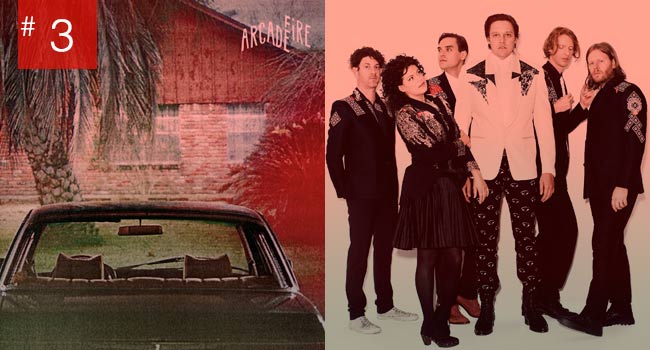
Arcade Fire – The Suburbs
In 2013, many Arcade Fire fans complained about the drastic sonic changes the band undertook with fourth album Reflektor, but this grievance ignores that Arcade Fire have been chameleonic from their conception. The Suburbs, Arcade Fire’s third album, follows the sullen hymns of Neon Bible and the vital, high-stakes Funeral, two albums completely distinct in sound. As with any Arcade Fire album, it diverges from the band’s previous output on the surface, but maintains the universally resonant vocal harmonies and strikingly relatable lyrics of what came before. In fact, The Suburbs, as its super specific title suggests, stands out from Arcade Fire’s thoroughly incredible discography as perhaps their most lyrically impressive, tying the band members’ suburban childhood to the poignant emotions of nostalgia, glee, and despair.
The key to The Suburbs’ appeal is that one need not come from a suburban background to enjoy it. The band has stated that the album neither supports nor denounces the suburbs; what they’ve never said, but what’s quite obvious from listening, is that the suburbs merely frame this album’s universal experiences. “Ready to Start” recalls high school anxiety and romance; the exuberant “Empty Room” relishes letting your guard down and getting in touch with your feelings; woeful “Suburban War” explores the anguish of growing apart from childhood friends; sprightly synthpop (!!!) jam “Sprawl II (Mountains Beyond Mountains)” recalls the restlessness of teenage years. Emphasizing the resonance of these widely sympathizable instances are some of the most straightforward instrumentals Arcade Fire has ever committed to record. The ostentatious, bold orchestral rush of Funeral has its time and place, as does the weighty, almost holy Neon Bible, but The Suburbs’ move towards more familiar rock stylings holds the most widely appealing songs of the band’s career. It may have once felt impossible for Arcade Fire to be responsible for songs as straightforwardly everyman-like and stable as “We Used to Wait,” but The Suburbs is rife with such simple and powerful moments. In transforming one lifestyle to a universally human experience, Arcade Fire have gifted listeners with a truly wonderful collection. [Max]
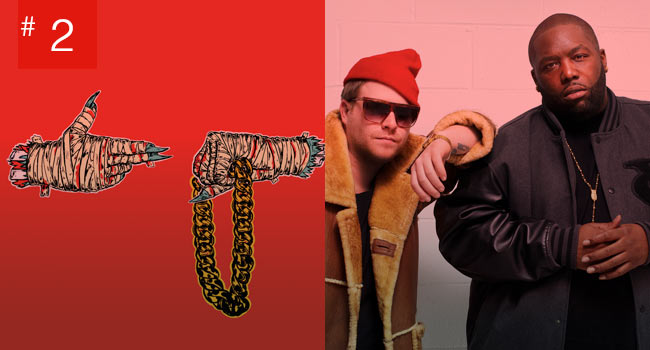
Run the Jewels – Run the Jewels 2
The best rap duo on this planet prove once again why they’re the best with their second studio album, Run The Jewels 2. They’re so good that they don’t even need a real album title, which is of course the greatest thing about Killer Mike and El-P; their simple approach to the art of hip-hop. No fancy dressing, no intellectual pretense, just raw and undiluted rap, two guys spitting about the way they see the world around them. Augmented by El-P’s immense and brooding productions, full of ominous beats and absurdly catchy samples, the duo’s dynamite chemistry takes center stage once again. Take a particular exchange from the pessimistically titled “Close Your Eyes (And Count To Fuck),” when El finishes off his verse with, “No shitting you, little buddy, this fuckin’ island’s a prison/The only solace I have is the act of conjugal visitin” and Mike takes over with “My solitary condition’s preventin’ conjugal visits/Though mainly missin’ my missus, they keepin’ me from my children/Conditions create a villain, the villain is given vision” and on he goes, killing it with alliteration and violent imagery. Think of how 99% of rappers out there have at least one slow love ballad that’s more akin to R&B than rap, and then play Run The Jewels’ version of that, the profanity-laced “Love Again,” brimming with macho confidence and alpha male aggression. Certainly not for the faint of heart, nor the easily offended, RTJ 2 builds on the group’s successful debut album and creates something with irreverent force and biting commentary, every track essential for the overall deconstructive power of the album. The duo paint a harsh, cynical, picture of the America they live in, but if it’s inspiring this kind of artistry, it can’t be all that bad, can it? [Nik]
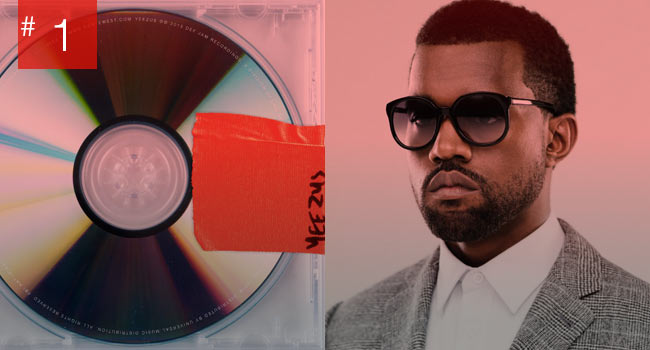
Kanye West – Yeezus
“Yeezy season approachin’/fuck whatever y’all been hearin’/fuck whatever y’all been wearin’/a monster about to come alive again.”
These are the first lyrics we hear on Yeezus, the sixth and most recent album from one of the most restless, creative, outspoken minds to ever exist within hip-hop’s framework (or the framework of all music ever, really). These first words’ promise is delivered upon: Yeezus is a savage beast, showing Kanye at his most irreverent, angry, and combative. West pulls a complete 180 on this album in every way. Compared to his previous albums, it’s ridiculously short, much less lush and finely detailed, far more abrasive, scathing, and industrial-influenced. This is still the one and only Kanye West though; despite Yeezus hosting some of his most inane lyrics to date (“Eating Asian pussy, all I need was sweet and sour sauce” is actually a line on this album), West’s ego and striking political stances remain clearly and viciously in focus. With Ye’s character shining through these unprecedentedly heavy, pummeling songs, they sound revolutionary, controversial, and incendiary, and have proven to be so within hip-hop music in the not quite two years since the album’s release.
Before Yeezus, Death Grips was the decade’s only act dividing the hip-hop community in a debate about the merit of noise, confrontation, and pure bile in rap music. Since Yeezus, so many rappers have felt the power that melding industrial doom with hip-hop groove can have. Tyler, the Creator’s Cherry Bomb is only the most recent of the new wave of hip-hop albums attempting to recreate the hallowed, terrifying glory that Yeezus delivered upon its arrival. Sure, aggression and political revolution have been vital themes of hip-hop for a long time, but here we have Ye literally screaming in revolt on “New Slaves” both for himself and for the entire black community, and we also bear witness to a track called “I Am a God” on an album whose title is a Jesus pun. The former track is essential: Public Enemy probably feels intense pride in Ye’s takedown of the prison-industrial system on this song, which employs some of the most blaring, ear-shattering percussion that hip-hop has ever heard. Its lyrics loudly rebel against institutional racism, as does “Black Skinhead,” another one of Yeezus’ most blatantly cacophonous songs.
Yeezus is incredibly dissonant and raucous for a hip-hop album, a fitting sound for its often political nature. Hell, even when this album isn’t political, it’s political. “Blood on the Leaves” narrates the hell of divorce proceedings, seemingly not a political topic, except that the song is built from a sample of Nina Simone’s take on anti-lynching classic “Strange Fruit.” “Black bodies/swingin’ in the summer breeze” is woven into the very essence of this track, which brilliantly constructs a club banger from a pre-civil rights movement protest song. Forget convention, forget tradition; this is the point of Yeezus both lyrically and musically, except on final track “Bound 2,” which was probably placed last on the album deliberately. It’s a throwback that unexpectedly recalls debut The College Dropout with its pitch-shifted soul samples and soulful production, yet it still feels padded with the risk and boldness pervading Yeezus. Kanye may be making some of hip-hop’s widest strides forward, but he still hasn’t forgotten where he came from. Hopefully none of Yeezus’ many followers ignore the path Yeezy took to get here. [Max]
See the rest of our Best Albums Of The Decade lists!
View Previous Sections of the List:
Best 50 Albums of the Decade So Far (#50 – #41)
Best 50 Albums of the Decade So Far (#40 – #31)
Best 50 Albums of the Decade So Far (#30 – #21)
Best 50 Albums of the Decade So Far (#20 – #11)
